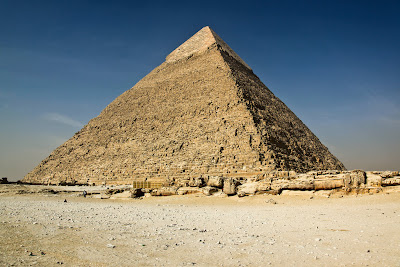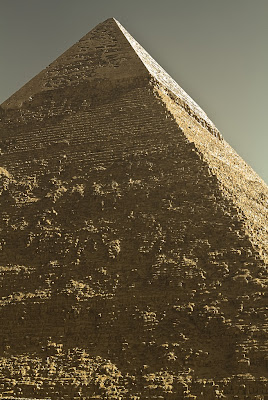Saturday, 6 July 2013
The Pyramid Of Chefren - World Historical Spot To Visit 2013
 The Pyramid of Chefren, frequently called the "Second Pyramid", is constructed beside the Great Pyramid of Khufu (Cheops). Chephren is the child and successor of Khufu and Hensuten. Khufu's other offspring and additionally successor, Ra'djedef, began building his own particular pyramid at Abu Rawash, which is north of Giza. Chephren's pyramid is composed more unobtrusively than Khufu's. The Chephren pyramid initially was 10 feet (3m) shorter and 48 feet (14.6m) more limited at the base. The evaluated weight of every last one of stones in the pyramid is 4,880,000 tons. In light of the fact that it is based on the level, it looks taller from generally points than Khufu's pyramid. The slant of the plots is higher, 53 degrees contrasted with Khufu's 51 degrees.
The Pyramid of Chefren, frequently called the "Second Pyramid", is constructed beside the Great Pyramid of Khufu (Cheops). Chephren is the child and successor of Khufu and Hensuten. Khufu's other offspring and additionally successor, Ra'djedef, began building his own particular pyramid at Abu Rawash, which is north of Giza. Chephren's pyramid is composed more unobtrusively than Khufu's. The Chephren pyramid initially was 10 feet (3m) shorter and 48 feet (14.6m) more limited at the base. The evaluated weight of every last one of stones in the pyramid is 4,880,000 tons. In light of the fact that it is based on the level, it looks taller from generally points than Khufu's pyramid. The slant of the plots is higher, 53 degrees contrasted with Khufu's 51 degrees.
The highest point of the pyramid still has a percentage of the limestone packaging that once secured the whole pyramid. There might have been a change in the technique for positioning the obstructs that has kept these pieces still sound. It gives the presence of a white top on top of the pyramid. As was Khufu's pyramid, the pyramid of Chephren had been plundered before it was entered in 1818 by Belzoni.
The Mortuary Temple of Chefren is to the east of the pyramid and is preferable safeguarded over Khufu's sanctuary. Chephren's sanctuary is more extravagant, despite the fact that the statues and different substance have been stolen than his father's. A portion of the limestone dividers had stone packaging, which is still show in a few spots. Parts of a little asylum, toilets, a patio and a great corridor with columns still remain. A thoroughfare that associated the Mortuary Temple to the Valley Temple is preferable safeguarded over any possible interstate.
The pyramid of Chefren is the biggest pyramid in Egypt. Formerly it was evaluated that it comprised of 2.3 million limestone squares, however a later activity by the Supreme Council for Antiquities in Egypt evaluates one and only million stones were utilized. The greater part of pieces weigh 2-5 tons; some weigh 15 tons.the rock obstructs inside the internment chamber weigh 50 tons. The definitive stature of the pyramid was 146 meters.
The pyramid was just part of an extensive funerary complex. The point when the pharaoh expired, the consecrated minister performed the "opening of the mouth" function at the Valley Temple. At that point the form might be transported past the Mortuary Temple where the relatives stood to give offerings (milk, water, lager, and wine). After this, the form was taken into the pyramid and the pyramid was fixed – never to be opened again.
When building a pyramid, the architects of Pharaoh Chefren discovered an area with a suitable quarry close by. At the time they hit a segment of friable limestone that pulverized effectively, the choice was made to cut it into a Sphinx. The Sphinx is 57 m long and 20 m high. The Sphinx likely bears the substance of Chefren (Kafre), the manufacturer of both the Sphinx and the second biggest pyramid. The Sphinx was covered in sand until 1926; it was restored between 1988-1998.
Pyramid Of Chefren

Author: World For Travel
I'm the owner of this site, I like to get all information about World Travel and share on internet. I'm so into traveling the world. I have been to many countries only for travel purpose. I like to do photography of all world places. Read More →
Related Posts:
Egypt Historical Places
Subscribe to:
Post Comments (Atom)























0 comments: